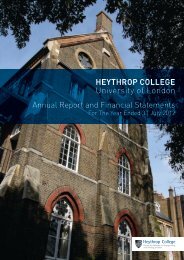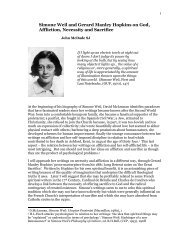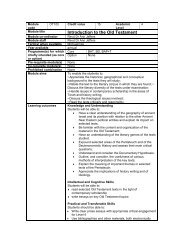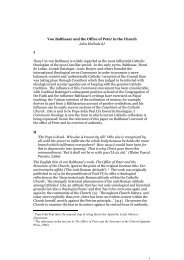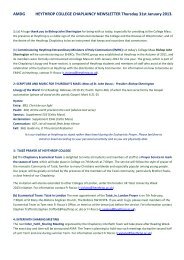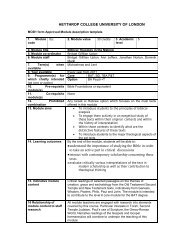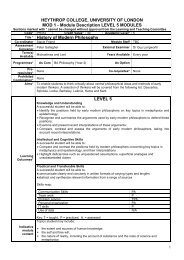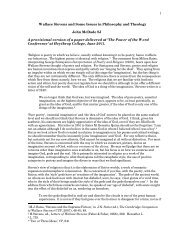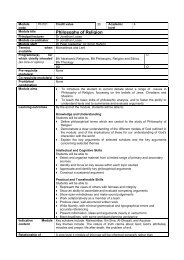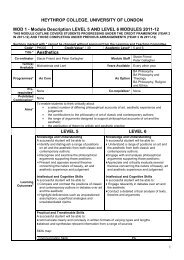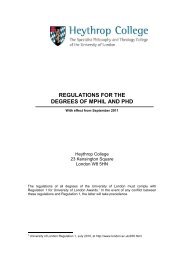Academic Regulations for first degrees and ... - Heythrop College
Academic Regulations for first degrees and ... - Heythrop College
Academic Regulations for first degrees and ... - Heythrop College
You also want an ePaper? Increase the reach of your titles
YUMPU automatically turns print PDFs into web optimized ePapers that Google loves.
34. Intermediate Awards<br />
34.1. Awards of Certificate of Higher Education (CertHE) or of Diploma of Higher<br />
Education (DipHE) will normally be conferred by the <strong>College</strong> (not by the<br />
University) in cases where students leave the programme of study without<br />
successfully completing the degree, but having accumulated the credit required<br />
<strong>for</strong> one of these awards, as detailed below.<br />
34.2. To be eligible <strong>for</strong> the award of CertHE, a student must have passed four<br />
whole modules or the equivalent in half modules at level 4 within the approved<br />
programme of study defined in the relevant programme specification. The Board<br />
of Examiners may, at its discretion, approve the award of a CertHE to a student<br />
who has completed four whole modules or the equivalent in half modules,<br />
comprising agreed modules from level 4 <strong>and</strong> level 5, provided that the Board is<br />
satisfied that these constitute a coherent programme of study appropriate to the<br />
title of the award.<br />
34.3. To be eligible <strong>for</strong> the award of DipHE, a student must have passed eight<br />
modules or equivalent in half modules, including at least four modules (or<br />
equivalent) at level 5/6), within the approved programme of study defined in the<br />
programme specification.<br />
33.4. A student who accepts the award of CertHE or DipHE is not entitled to be<br />
readmitted to complete the degree. He or she may apply, at a later date, <strong>for</strong> entry<br />
with credit <strong>for</strong> prior study, <strong>and</strong> may be considered in the same way as any other<br />
applicant.<br />
35. The determination of classification<br />
35.1. To be eligible <strong>for</strong> the award of a Bachelor’s degree with Honours,<br />
c<strong>and</strong>idates must normally have passed all the required modules. Exceptionally,<br />
the Board of Examiners may compensate marginal failure in one whole module<br />
or up to two half modules, with marks not below 30%. Failure in the<br />
undergraduate dissertation may not be compensated.<br />
35.2. A c<strong>and</strong>idate who has marginally failed one module (or up to two half<br />
modules) <strong>and</strong> is offered compensation may not opt to be reassessed in the<br />
module(s).<br />
35.3. Classification of honours <strong>degrees</strong> is based on the following indicative scale<br />
of determining marks (see regulation 35.4):<br />
70% or above First Class Honours<br />
60-69% Upper Second Class Honours (2.1)<br />
50-59% Lower Second Class Honours (2.2)<br />
45-49% Third Class Honours<br />
40-44% Pass Classification<br />
35.4. The determining mark <strong>for</strong> purposes of classification is derived as follows:<br />
• In accordance with the approved module assessment scheme, two identical<br />
percentage marks are assigned to each whole module <strong>and</strong> to the Dissertation;<br />
• One percentage mark is given <strong>for</strong> each half module;<br />
26



